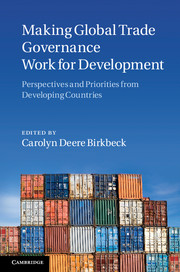 Making Global Trade Governance Work for Development
Making Global Trade Governance Work for Development Book contents
- Frontmatter
- Contents
- Figures
- Tables and boxes
- Contributors
- Acknowledgements
- Introduction
- Part I Global trade governance
- Part II Roles and responsibilities in global trade governance: diversity in developing country priorities and strategies
- Part III Strengthening multilateralism
- Part IV Making WTO negotiations and decision-making processes fairer
- 16 Towards fair and inclusive decision-making in WTO negotiations
- 17 Revisiting the single undertaking
- 18 Enhancing developing country participation in global trade governance through South–South coalitions in the WTO
- 19 Inclusive trade governance
- 20 Global trade governance and development
- Part V Conclusion
- Index
- References
17 - Revisiting the single undertaking
towards a more balanced approach to WTO negotiations
from Part IV - Making WTO negotiations and decision-making processes fairer
Published online by Cambridge University Press: 07 September 2011
- Frontmatter
- Contents
- Figures
- Tables and boxes
- Contributors
- Acknowledgements
- Introduction
- Part I Global trade governance
- Part II Roles and responsibilities in global trade governance: diversity in developing country priorities and strategies
- Part III Strengthening multilateralism
- Part IV Making WTO negotiations and decision-making processes fairer
- 16 Towards fair and inclusive decision-making in WTO negotiations
- 17 Revisiting the single undertaking
- 18 Enhancing developing country participation in global trade governance through South–South coalitions in the WTO
- 19 Inclusive trade governance
- 20 Global trade governance and development
- Part V Conclusion
- Index
- References
Summary
The idea of a ‘single undertaking’ was first introduced as a procedural device in the Punta del Este Declaration, which formally launched the Uruguay Round of multilateral trade negotiations in 1986. Since then, the scope, function and impact of the single undertaking have evolved considerably.
While the single undertaking was originally constructed as a mechanism for preventing negotiations from advancing in areas that may be of interest to some countries but not others, by the end of the Uruguay Round it was used to secure the final package deal that enabled the establishment of the World Trade Organization (WTO). Later on, with the launch of the Doha Round in 2001, the meaning and role of the single undertaking changed further as it acquired the status of an almost immutable ‘principle’ whereby nothing can be agreed, until everything is agreed.
- Type
- Chapter
- Information
- Making Global Trade Governance Work for DevelopmentPerspectives and Priorities from Developing Countries, pp. 486 - 506Publisher: Cambridge University PressPrint publication year: 2011
References
- 1
- Cited by


